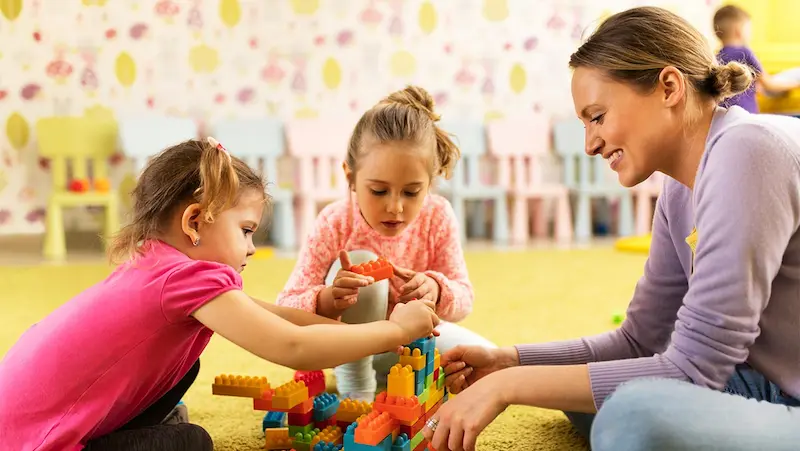Child development is a critical aspect of human growth and potential. Understanding its significance is vital for creating a strong foundation for a child’s future. The early years of a child’s life lay the groundwork for physical, cognitive, emotional, and social development.
Recognizing the importance of child development enables us to provide nurturing environments and supportive experiences that foster their overall well-being and long-term success.
Table of contents
The Different Stages of Child Development

Every child’s journey of growth is a magical and awe-inspiring experience. From the tender moments of infancy to the exuberance of childhood, each stage brings forth unique milestones that shape their development. Let’s take a brief look at the four crucial stages of child development and the remarkable milestones they achieve.
Infant Development Milestones:
The infant stage, spanning from birth to 12 months, is a time of rapid growth and discovery. During this period, babies develop essential motor skills like grasping, rolling over, and sitting up independently. Their sensory abilities flourish, and they delight in exploring the world through sight, touch, taste, and sound.
Toddler Milestones:
Between the ages of 1 to 3 years, toddlers embark on an adventure of exploration and self-discovery. This stage is characterized by an explosion of language development as they start expressing themselves with words and simple sentences. The world becomes their playground, and they actively engage in activities like running, jumping, and climbing.
Preschooler Milestones:
The preschool years, from 3 to 5 years, mark a period of tremendous cognitive, social, and emotional growth. Preschoolers show an eagerness to learn and are curious about the world around them. They refine their fine motor skills, enabling them to draw, cut, and handle small objects with precision. The imaginative play takes center stage, fostering creativity and problem-solving abilities.
School-Age Child Milestones:
As children progress from ages 6 to 12, they enter the school-age phase, characterized by significant cognitive advancements. Reading, writing, and numeracy skills take shape, paving the way for academic success. Children develop a sense of responsibility, self-identity, and empathy. They participate in organized activities, hobbies, and sports, building their self-confidence and teamwork skills.
Physical Development
As children grow, their physical development becomes a canvas for exploration and learning. Three key aspects play a crucial role in shaping their abilities: gross motor skills, fine motor skills, and of sensory development.

Gross Motor Skills
Gross motor skills involve the coordinated movements of large muscle groups that enable activities like crawling, walking, jumping, and running. These fundamental skills form the foundation for a child’s physical prowess and facilitate their engagement in sports and physical activities.
Fine Motor Skills
Fine motor skills encompass the precise movements of small muscles, such as those in the fingers and hands. These skills are crucial for activities like writing, drawing, buttoning clothes, and using utensils.
Sensory Development
Sensory development refers to how children use their senses to explore and make sense of the world around them. The five senses—sight, hearing, touch, taste, and smell—play a vital role in shaping a child’s perception and understanding of their environment.
Cognitive Development
As children grow and explore the world around them, their minds undergo an incredible transformation. Cognitive development refers to the progressive and intricate changes in a child’s thinking, reasoning, and problem-solving abilities. Child cognitive development is a fascinating process as young minds explore and understand the world around them through various stages of growth.

Cognitive Skills:
Cognitive skills are the building blocks of a child’s mental development. These skills encompass a wide range of processes, including attention, memory, perception, and comprehension. As children engage in various activities and experiences, their cognitive skills evolve, enabling them to absorb knowledge from their environment and build connections between different pieces of information.
Language Acquisition:
Language acquisition plays a pivotal role in cognitive development. From the moment a child is born, they are surrounded by language in all its forms. Initially, they start by recognizing sounds and imitating simple gestures. As they grow, they begin to comprehend words, form sentences and express their thoughts and emotions.
Problem-Solving Abilities:
As children’s cognitive skills and language proficiency expand, so do their problem-solving abilities. Problem-solving is an essential life skill that empowers children to identify challenges, analyze options, and make informed decisions. Also, Learn about computer games for kids also.
The Role of Parents and Educators in Supporting Healthy Child Development
As the primary influences in a child’s life, parents and educators play a crucial role in shaping their physical, emotional, and cognitive development. By fostering positive parent-child interactions, employing effective parenting techniques, and creating stimulating learning environments, they can lay a strong foundation for a child’s lifelong success and well-being
Effective parenting plays a crucial role in supporting and nurturing child development. By providing love, support, and guidance, parents can create a safe and stimulating environment for their children to explore, learn, and grow. Positive parenting practices, such as active listening, setting boundaries, and promoting a growth mindset, contribute to the emotional, cognitive, and social development of children, fostering their self-esteem and overall well-being as they navigate the various stages of life.

Parent-Child Interaction:
The bond between a parent and child forms the bedrock of healthy development. Regular, loving interactions build trust and security, enabling children to explore the world with confidence. Spending quality time together, actively listening to their thoughts and feelings, and engaging in play are vital components of nurturing this connection. Attachment parenting is a parenting philosophy that emphasizes building a strong emotional bond between parents and children through sensitive and responsive caregiving. Parent-child interaction in attachment parenting involves meeting the child’s needs promptly, providing comfort and security, and being attuned to their emotions, fostering a sense of trust and connection that positively influences the child’s emotional and social development.
Positive Parenting Techniques:
Parenting with positivity and patience yields numerous benefits. Encouragement and praise boost a child’s self-esteem and motivation to learn, while setting clear boundaries fosters a sense of security and responsibility. Emphasizing problem-solving and communication rather than punishment promotes empathy and resilience.
Creating a Stimulating Learning Environment:
Both parents and educators can collaborate to provide a stimulating learning environment that nurtures a child’s curiosity and cognitive growth. Incorporating age-appropriate educational activities, such as reading, arts, and hands-on experiences, sparks a child’s imagination and promotes a love for learning. Learn about coding camps for kids also.
The Impact of Technology on Child Development
In today’s digital age, technology has become an integral part of our lives, including the lives of our children. As parents and caregivers, it’s essential to strike a balance between leveraging technology for educational purposes and managing screen time to ensure optimal development.

Screen Time Effects on Children’s Development:
Excessive screen time has been associated with various adverse effects on child development. Studies suggest that extended exposure to screens, especially for young children, may impede the development of social skills and emotional regulation.
Digital Media Guidelines for Children:
To promote healthy child development while incorporating technology responsibly, it is crucial to establish digital media guidelines for children. The American Academy of Pediatrics recommends the following:
1. Age-Appropriate Content: Ensure the content accessed by children is suitable for their age and aligns with educational objectives.
2. Limited Screen Time: Set reasonable limits on screen time based on age. For example, children aged 2 to 5 should have no more than one hour of screen time per day.
3. Co-Viewing and Interaction: Engage in media activities with your child to promote active learning and discussion.
4. Tech-Free Zones: Designate certain areas in the home, such as the dining table and bedrooms, as tech-free zones to encourage family interactions and quality sleep.
Technology in Education:
When used effectively, technology can enhance education and foster a love for learning in children. Educational apps, interactive learning platforms, and online resources provide engaging opportunities for kids to explore new concepts and improve their skills. Integrating technology in the classroom can also personalize learning experiences and cater to individual learning styles, promoting better comprehension and retention.
Conclusion
In conclusion, unlocking your child’s full potential is a journey of nurturing and guidance. With expert advice on child development, you can provide the support and environment needed for your child to flourish.
Embrace their unique strengths, encourage curiosity, and foster a love for learning. Remember, every child is capable of greatness when given the right tools and encouragement. Start now and witness the amazing transformation as your child reaches their full potential.
BrightChamps offers coding for kids programs that open up exciting career pathways in the digital world. By nurturing their coding skills and problem-solving abilities from an early age, children gain a competitive edge and a passion for technology, preparing them for future success in a rapidly evolving job market.
BrightChamps goes beyond traditional education, offering captivating content and interactive learning experiences that inspire curiosity, ignite a passion for learning, and nurture personal growth in young minds.
BrightChamps blog page offers valuable insights and guidance for parents and kids, helping them explore and prepare for exciting career opportunities in the future.
Frequently Asked Questions
A1. Expert child development strategies can optimize your child’s learning, behavior, and emotional well-being, setting a strong foundation for future success.
A2. Encourage regular physical activity, provide a nurturing environment, promote open communication, and offer opportunities for creative expression and exploration.
A3. Engage in interactive play, read together regularly, provide age-appropriate puzzles and games, and offer opportunities for hands-on learning experiences.
A4.There are various books, apps, and online resources specifically designed to develop emotional intelligence in children through activities, games, and guided exercises.
A5. Encourage cooperative play, teach empathy and active listening, provide opportunities for group activities, and be a positive role model in social interactions.
A6. Empowering your child academically and personally can lead to increased self-confidence, higher academic achievement, improved problem-solving skills, and better overall well-being.
A7. Yes, these strategies are often tailored to address the unique needs and developmental stages of children from infancy through adolescence.









